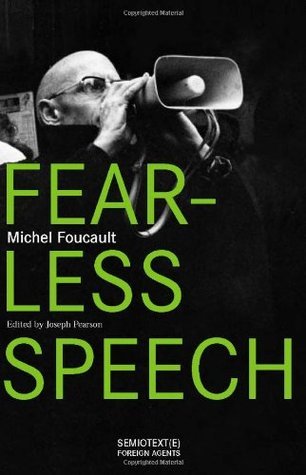
I would like to distinguish between the ‘history of ideas’ and the ‘history of thought.’ The history of ideas involves the analysis of a notion from its birth, through its development, and in the setting of other ideas, which constitute its context. The history of thought is the analysis of the way an unproblematic field of experience becomes a problem, raises discussions and debate, incites new reactions, and induces crisis in the previously silent behaviors, practices, and institutions. It is the history of the way people become anxious, for example, about madness, about crime, about themselves, or about truth. Comprised of six lectures delivered, in English, by Michel Foucault while teaching at Berkeley in the Fall of 1983, Fearless Speech was edited by Joseph Pearson and published in 2001. Reviewed by the author, it is the last book Foucault wrote before his death in 1984 and can be read as his last testament. Here, he positions the philosopher as the only person able to confront power with the truth, a stance that boldly sums up Foucault’s project as a philosopher. Still unpublished in France, Fearless Speech concludes the genealogy of truth that Foucault pursued throughout his life, starting with his investigations in Madness and Civilization, into the question of power and its technology. The expression “fearless speech” is a rough translation of the Greek parrhesia, which designates those who take a risk to tell the truth; the citizen who has the moral qualities required to speak the truth, even if it differs from what the majority of people believe and faces danger for speaking it. Parrhesia is a verbal activity in which a speaker expresses his personal relationship to truth through frankness instead of persuasion, truth instead of flattery, and moral duty instead of self-interest and moral apathy. Michel Foucault (1926–84) is widely considered to be one of the most influe
Author

Michel Foucault was a French philosopher, social theorist and historian of ideas. He held a chair at the Collège de France with the title "History of Systems of Thought," but before he was Professor at University of Tunis, Tunisia, and then Professor at University Paris VIII. He lectured at several different Universities over the world as at the University at Buffalo, the University of California, Berkeley and University of São Paulo, University of Rio de Janeiro, Brazil. Foucault is best known for his critical studies of social institutions, most notably psychiatry, medicine, the human sciences and the prison system, as well as for his work on the history of human sexuality. His writings on power, knowledge, and discourse have been widely influential in academic circles. In the 1960s Foucault was associated with structuralism, a movement from which he distanced himself. Foucault also rejected the poststructuralist and postmodernist labels later attributed to him, preferring to classify his thought as a critical history of modernity rooted in Immanuel Kant. Foucault's project was particularly influenced by Nietzsche, his "genealogy of knowledge" being a direct allusion to Nietzsche's "genealogy of morality". In a late interview he definitively stated: "I am a Nietzschean." Foucault was listed as the most cited scholar in the humanities in 2007 by the ISI Web of Science.